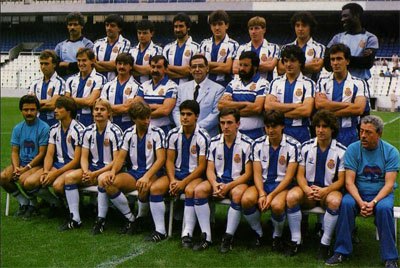RCD Espanyol

|
| Picture of the team in the 1980s. |
RCD Espanyol — History, Identity & Catalan Legacy
Foundation — A Club for Catalan Students (1900)
RCD Espanyol was founded on 28 October 1900 by engineering student Ángel Rodríguez. Unlike FC Barcelona, which was established by foreigners, Espanyol’s identity was rooted in local Catalan youth. This difference created an early cultural distinction that continues to define the club today.
The Birth of the “Pericos”
Espanyol supporters are known as “Pericos” (parakeets). The nickname began in the 1920s when a popular comic strip featured adventurous little birds, and the club’s fans embraced the identity with pride. Today, “Perico” culture is a symbol of Espanyol loyalty and unity.
Early Competitions & Catalan Football Rise (1900–1930)
In the early decades, Espanyol established itself as a major force in Catalan and Spanish football. The team won several regional championships and regularly competed in national tournaments. The club’s growing fanbase and competitive nature helped shape Barcelona’s football identity as a whole.
Copa del Rey Success — Early Trophies
Espanyol achieved early national success by winning
the Copa del Rey in:
• 1929
• 1940
• 2000
• 2006
These victories established Espanyol as one of Spain’s most respected cup teams, particularly admired for their determination and underdog spirit.
Sarrià Stadium — The Emotional Home (1923–1997)
For more than 70 years, Sarrià Stadium was the heart of Espanyol. It witnessed dramatic derbies, historic victories, and unforgettable fan celebrations. Though demolished in 1997, Sarrià remains deeply loved and remembered as the spiritual home of Pericos.
Relegations, Resilience & Revival (1980–2000)
Espanyol experienced periods of instability, including relegations and financial struggles. However, each setback strengthened the club. The 1988 UEFA Cup campaign, where Espanyol reached the final against Bayer Leverkusen, remains one of the proudest moments in club history.
Modern Era — RCDE Stadium & New Ambition
In 2009, Espanyol inaugurated the RCDE Stadium in Cornellà-El Prat. Modern, elegant, and atmospheric, it became the new fortress for Pericos worldwide. The stadium symbolizes the club’s ambition to grow and establish itself as a stable top-flight competitor.
Notable Legends — Icons of the Club
RCD Espanyol has been home to several great players, including:
• Raúl Tamudo — all-time top scorer
• Dani Jarque — a symbol of eternal captaincy
• Sergio García
• Urruti
• Rufete
• Pochettino (player & manager)
Dani Jarque, who tragically passed away in 2009, remains an everlasting symbol of Espanyol’s heart and loyalty.
Derbi Barceloní — Rivalry with FC Barcelona
The rivalry between Espanyol and Barcelona is one of Spain’s most emotional derbies. While Barça represents global power, Espanyol represents passion, resilience, and local identity. Matches between the two clubs carry cultural, political, and sporting significance that goes far beyond football.
The Spirit of Espanyol — Loyalty, Pride & Family
Espanyol’s identity is built on loyalty, togetherness, and unbreakable community spirit. Their fans remain passionate regardless of results, creating one of the most dedicated supporter cultures in Spain. The club’s essence can be described in one feeling: Perico pride — loyal forever.

The Espanyol crest features the royal crown and blue–white stripes, representing the club’s historic colors and royal patronage received in 1912.
